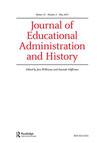Creative industries curriculum design for living and leading amid uncertainty
IF 1.6
Q2 EDUCATION & EDUCATIONAL RESEARCH
Journal of Educational Administration and History
Pub Date : 2021-05-28
DOI:10.1080/00220620.2021.1928613
引用次数: 1
Abstract
ABSTRACT Government policies are forcing universities to narrowly emphasise employability, which does not bode well for the Creative Industries (CI). Despite being one of the fastest-growing and diverse employment sectors, CI degrees have been criticised for failing to deliver adequate employment prospects. The employability focus, which serves ‘the [economic] system’ [Habermas, Jürgen. 1987. The Theory of Communicative Action. Volume 2 Lifeworld and Ssystem: The Ccritique of Functionalist reason, Translated by T McCarthy. Cambridge: Polity Press], ignores both the employment precarity in the sector and diminishes universities’ capacity to serve the lifeworld (Harbernas) to facilitate graduate citizenship. Dichotomising employability and citizenship fail to consider the supercomplexity of the twenty-first Century [Barnett, Ronald. 2000a. Realizing the University in an Age of Supercomplexity. Buckingham: Open University Press], constituted by the co-existence of a multiplicity of epistemological frameworks. In this paper, we draw on supercomplexity and the concept of the system and lifeworld to investigate how to develop CI curricula that foster employability and citizenship. Using an illustrative case, we demonstrate how CI curricula can be designed to support students to navigate multiple ideological geographies, facilitate employability, and contribute to civic society.创意产业课程设计的生活和领导的不确定性
政府政策正迫使大学狭隘地强调就业能力,这对创意产业(CI)来说并不是一个好兆头。尽管CI学位是增长最快、多样化的就业领域之一,但它却因未能提供充足的就业前景而受到批评。就业能力的焦点,服务于“(经济)体系”[哈贝马斯,j rgen。1987. 交际行为理论。第二卷生活世界与系统:对功能主义理性的批判,T·麦卡锡译。剑桥:政治出版社],既忽视了该领域就业的不稳定性,又削弱了大学为生活世界服务的能力(Harbernas),以促进毕业生的公民身份。就业能力和公民身份的二分法没有考虑到21世纪的超级复杂性[Barnett, Ronald. 2000]。在超级复杂时代实现大学。白金汉:开放大学出版社],由多种认识论框架的共存构成。在本文中,我们利用超复杂性以及系统和生活世界的概念来研究如何开发促进就业能力和公民意识的CI课程。通过一个说明性案例,我们展示了如何设计CI课程来支持学生驾驭多种意识形态地理,促进就业,并为公民社会做出贡献。
本文章由计算机程序翻译,如有差异,请以英文原文为准。
求助全文
约1分钟内获得全文
求助全文
来源期刊

Journal of Educational Administration and History
EDUCATION & EDUCATIONAL RESEARCH-
CiteScore
3.80
自引率
5.60%
发文量
25
 求助内容:
求助内容: 应助结果提醒方式:
应助结果提醒方式:


